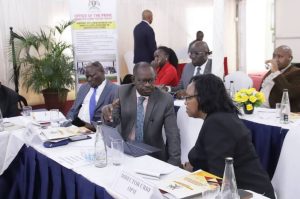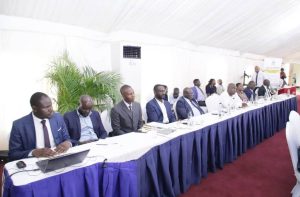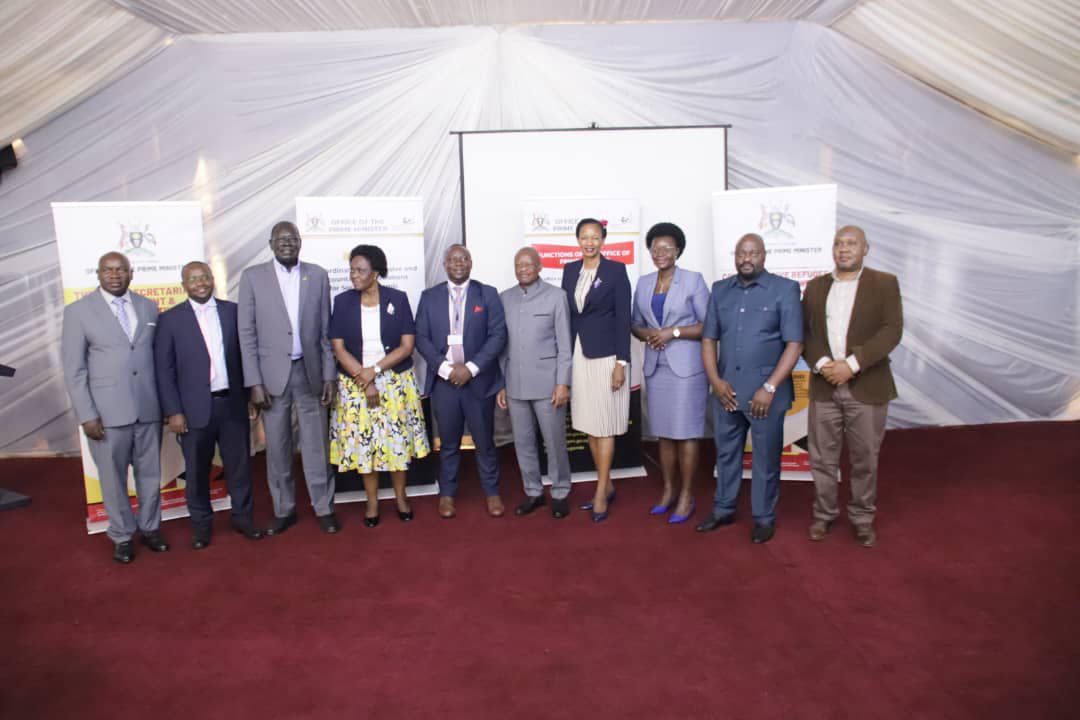By Alinaitwe Jotham
Kampala, Sheraton hotel
The Office of the Prime Minister under the Comprehensive Refugee Response Framework (CRRF) hosted an inaugural meeting aimed at assessing progress, identifying solutions and addressing challenges faced by the government, host communities and refugees in regards to service provision.
Chaired by Hon. Hillary Onek, the Minister for Relief, Disaster Preparedness, and Refugees, the meeting brought together key stakeholders, including Government Ministers, Local Government representatives, and humanitarian organizations.

Commissioner Refugees, Mr. Patrick Okello (centre) sharing an issue with the Director, CRRF Secretariat Ms. Helen Bugaari (right) during the Coordination Meeting
During the engagement, Hon. Eng. Onek highlighted the rapid increase in refugee population which necessitates urgent action. He called for a unified government approach to effectively manage and support both refugees and their host communities.
Members noted the fragmentation of funding and inability to see tangible results therefore calling for a different approach to be deployed.
“For example in Kyegegwa, we don’t have water, but we find there is ACORD offering water, there is another NGO offering water, and they are not doing the same thing. They are like fighting for this common goal, which is also affecting our people and even the host community,” remarked Hon. Frank Tumwebaze, the Minister for Agriculture, Animal Industry and Fisheries.
Patrick Okello, the Commissioner Refugees in the Office of the Prime Minister, emphasized the urgent need for sustainable strategies, particularly in regions like Obongi, which has become the highest refugee-hosting community.

A section of participants during the Coordination Meeting
The discussions yielded a number of innovative solutions aimed at safeguarding the welfare of both refugees and their hosts.
Hon. Hon. Ruth Nankabirwa the Minister for Energy and Mineral Development informed the gathering of a project focusing on clean cooking facilities to mitigate environmental impacts, while the Ministry of Agriculture Animal Industry and Fisheries highlighted the implementation of smart agriculture systems supported by the World Bank, aimed at enhancing food security and livelihoods for affected communities.
Participants agreed on the importance of regular dialogue, proposing that the inter-ministerial meeting should convene quarterly to monitor progress and address emerging challenges. Furthermore, they called for the Office of the Prime Minister to establish a task committee dedicated to following up on the commitments made during the meeting which will be comprised of technical personnel from different ministries and also different Civil Society Organizations.
As Uganda continues to welcome a growing number of refugees, the collaborative efforts highlighted in this meeting are crucial in ensuring that both refugees and host communities thrive together. The initiative underscores Uganda’s commitment to humanitarian principles and sustainable development in the face of one of the world’s most significant refugee crises.
END





